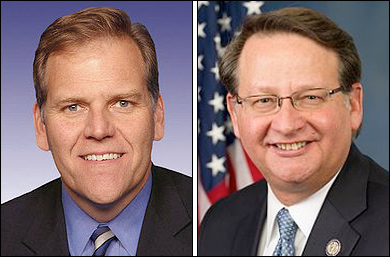A new EPIC-MRA poll (Sept. 7-10; 600 registered Michigan voters) places Gov. Rick Snyder (R) and potential Republican senatorial nominee Terri Lynn Land in an improved political position just as next year’s active campaign cycle is beginning. But, the poll’s methodology may contain a flaw. The sampling universe is arguably skewed slightly toward the GOP.
The survey’s ballot test posts Gov. Snyder to a 44-36 percent lead over former Rep. Mark Schauer (D-MI-7), a net seven-point swing in the incumbent’s favor since the last EPIC-MRA poll was conducted in May.
For the Senate race, Rep. Gary Peters (D-MI-14), the presumed Democratic nominee, is staked to only a one-point 38-37 percent edge over Land. In EPIC’s May poll, the firm tested Peters against Rep. Mike Rogers (R-MI-8) who, at that time, was considering entering the race. The result found the Democratic congressman leading his Republican colleague 37-30 percent. The current EPIC findings are very similar to a late July Denno Research poll that plotted the two candidates – Peters and Land – in a 39 percent deadlock.
The study, however, may not accurately reflect the proper composition of the Michigan electorate. Generally a state that leans Democrat, the sampling universe constructed for this particular survey is comprised of 39 percent self-identified Democrats, 36 percent who affiliate with the Republicans, and 25 percent either saying they are independent or named a minor party with which they associate. Michigan voters do not register as political party members, so it is difficult to ascertain an accurate total of each party’s loyalists. But, considering the electorate has supported President Obama twice with percentage splits of 54-45 percent (2012) and 57-41 percent (2008), it is reasonable to argue that EPIC’s Democratic share is low.
On the other hand, in the 2010 mid-term election, Snyder carried the state 58-40 percent under a much lower voter participation factor (in 2008, five million people cast ballots; in 2010, the total turnout was only 3.2 million). Therefore, considering that we are soon headed into another mid-term election, the partisan spread of just over three points could, in fact, be close to accurate for such a projected turnout model.
The Candidates
Though the Democratic leadership has Continue reading >



